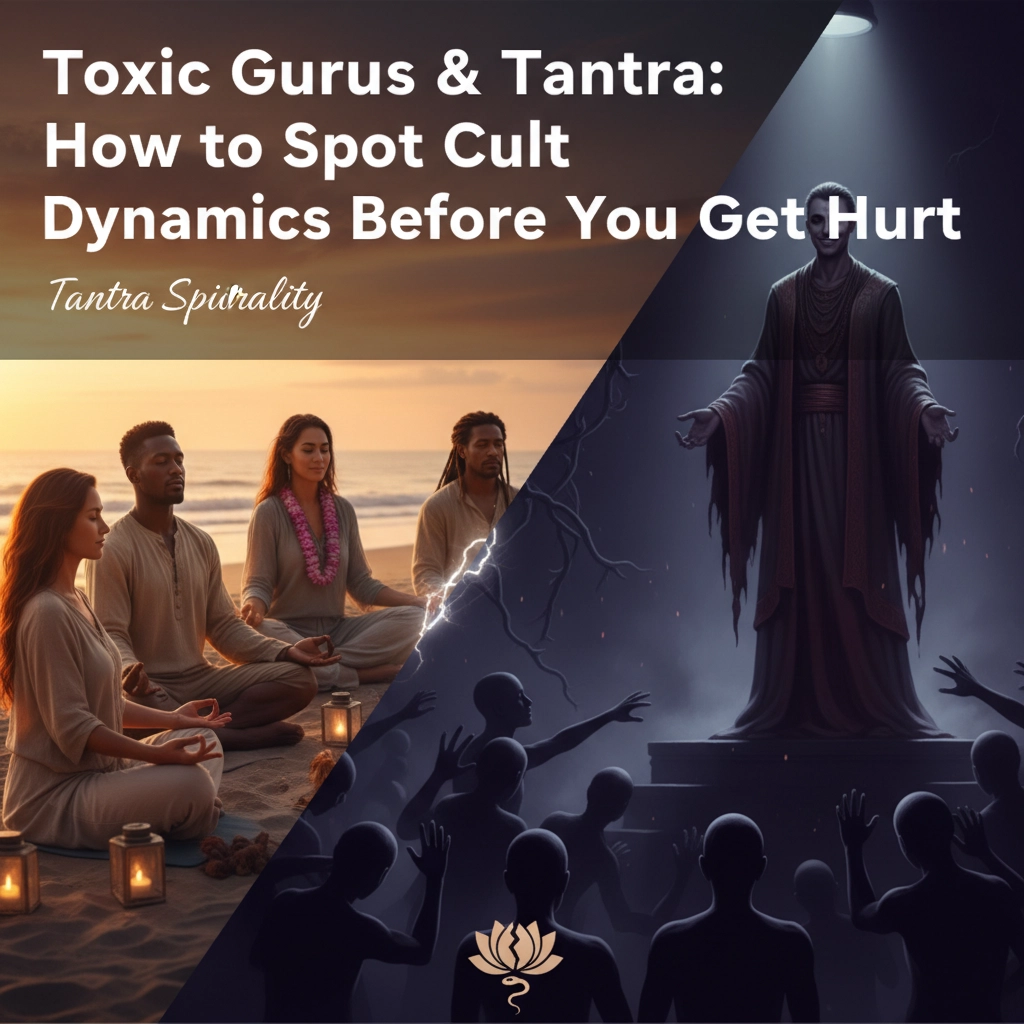Look, we need to talk about something that's happening way too often in tantric spaces: spiritual teachers who've gone completely off the rails and are using their position to manipulate, control, and sometimes outright abuse their students.
The tantric path is supposed to be about liberation, right? But somewhere along the way, certain "gurus" have figured out how to turn that beautiful seeking energy into a pipeline for their own ego trips, financial gain, and worse. And because tantra deals with such intimate aspects of human experience: sexuality, surrender, devotion: it creates the perfect storm for toxic dynamics to take root.
This isn't about being paranoid or cynical. It's about being smart. Because once you're deep in a toxic spiritual group, getting out becomes exponentially harder. Your whole identity, social circle, and sense of reality gets wrapped up in the leader's vision of you and the world.
The Guru Trap: How Normal Teachers Become Untouchable Gods
Here's how it usually starts: You meet a charismatic teacher who seems to have access to profound wisdom and transformative practices. They create powerful experiences for you: maybe through breathwork, ritual, or energy practices that genuinely shift something in your system. You feel seen, special, part of something bigger than yourself.
The love-bombing phase is intoxicating. The teacher and their inner circle shower you with attention, validation, and a sense of belonging you might have been craving for years. Everything feels magical and meaningful. You start thinking, "Finally, I've found my people. My path. My teacher."
But gradually, the rules start changing. What began as guidance becomes commands. What felt like wisdom starts sounding like gospel that cannot be questioned. The teacher's personality, preferences, and opinions become elevated to cosmic law.

The deification process is subtle but systematic. Students start referring to the teacher in hushed, reverent tones. Their every word gets analyzed for hidden meaning. Their flaws get reframed as "testing" or "divine play" that mere mortals couldn't possibly understand.
Once a teacher reaches untouchable status in a group's mind, accountability becomes impossible. How do you criticize God? How do you set boundaries with someone who supposedly has your highest good at heart and can see your karma from past lives?
Red Flags That Should Make You Run
Absolute authority with zero accountability. Healthy teachers have mentors, peer groups, and feedback systems. They admit mistakes and show genuine humility about their human limitations. Toxic leaders position themselves as the final authority on everything from spiritual matters to who you should date.
Financial opacity. Money flows upward to the teacher and their inner circle, but there's no transparency about how funds are used. Students are pressured to give beyond their means while the leader lives lavishly.
Isolation tactics. Your outside relationships become problematic. Friends and family who express concern are labeled as "unspiritual" or "holding you back." The group becomes your entire social world, making leaving feel impossible.
Punishment for questioning. Healthy spiritual communities encourage discernment and critical thinking. Toxic ones shame, shun, or expel anyone who asks hard questions or expresses doubt.
The "chosen one" narrative. You're told you're special, selected, or destined for a unique role in the teacher's mission. This creates psychological investment that's hard to walk away from, even when you witness harmful behavior.
Rationalized abuse. This is the big one. When you see or experience cruelty, manipulation, or boundary violations, you're told it's actually a blessing, a teaching, or necessary for your spiritual growth.
Why Tantra Is Especially Vulnerable
Tantric practices involve surrender, intimacy, and working with powerful energies. This creates natural vulnerability that toxic teachers know how to exploit.
Sexual manipulation gets disguised as spiritual transmission or healing. Students are told their resistance to sexual advances reflects their own spiritual blockages or traumas they need to overcome.
Surrender practices meant to help you release ego control get weaponized to break down healthy boundaries and critical thinking. You're told that questioning the teacher means you're "in your head" instead of "in your heart."
Esoteric knowledge becomes a form of currency and control. The teacher claims access to secret teachings or initiations that only they can provide, making students desperate to please them and terrified of losing access.

Energy and psychic claims can't be easily verified, making them perfect tools for manipulation. Students are told the teacher can see their auras, past lives, or spiritual progress: and these "insights" always seem to support whatever the teacher wants from them.
Healthy Spiritual Spaces vs. Toxic Ones
In healthy spiritual communities, teachers maintain clear boundaries, admit their limitations, and encourage students to think for themselves. There's transparency around money, decision-making processes, and community guidelines. Students are free to question, disagree, and leave without retaliation.
Healthy teachers have lives outside their role: friends, hobbies, interests that don't revolve around being seen as enlightened. They refer students to other teachers when appropriate and don't position themselves as the only source of truth or transformation.
Toxic environments center everything around the leader's personality, needs, and vision. Students exist to serve the teacher's agenda rather than their own growth. There's an us-versus-them mentality that paints the outside world as ignorant or dangerous.
In toxic spaces, the teacher's comfort and lifestyle take priority over student welfare. Resources flow upward while students are expected to sacrifice for the greater good: which somehow always aligns with what's convenient for the leader.
Protecting Yourself: Practical Steps
Trust your gut feelings. If something feels off, it probably is. Don't let anyone talk you out of your own direct experience of discomfort or concern.
Maintain outside relationships. Keep connections with friends and family members who knew you before you got involved with this teacher or group. Their perspectives can provide crucial reality checks.
Ask practical questions. Where does the money go? Who makes decisions and how? What happens to people who leave? How does the teacher handle criticism or conflict?
Set personal boundaries and see how they're received. Healthy teachers respect your limits around time, money, intimacy, and participation. Toxic ones will pressure, guilt, or manipulate you to override your own boundaries.

Research the teacher's background. Have other students made accusations? Are there patterns of harm? What do former long-term students say about their experience?
Keep your own life. Don't make the spiritual group your entire world. Maintain your job, hobbies, and identity outside the community. This gives you options if you need to leave.
Getting Out When You're In Deep
If you recognize yourself in a toxic situation, know that leaving is possible, even when it feels impossible. The shame, fear, and practical complications are real, but they're not permanent.
Start by reconnecting with your pre-group identity. What did you value before? What goals did you have? What relationships mattered to you? These anchors can help you remember who you are beyond the group's definition of you.
Document concerning behaviors if you feel safe doing so. This can help you process your experience later and potentially protect others.
Reach out for support. There are counselors who specialize in spiritual abuse and cult recovery. You don't have to navigate this alone.
Prepare practically for leaving if you live in community housing or are financially dependent on the group. Have a plan for where you'll go and how you'll support yourself.
Your Spiritual Journey Belongs to You
The bottom line? No human being: no matter how charismatic, insightful, or seemingly enlightened: should have unchecked power over your life, choices, or spiritual path.
Real transformation happens through your own direct experience and inner work, not through surrendering your power to someone else's vision of who you should become. Healthy spiritual teachers are guides and facilitators, not gods or owners of your soul.
Trust yourself. Trust your experience. And remember that walking away from a toxic situation isn't giving up on your spiritual growth( it's protecting space for real growth to happen.)



